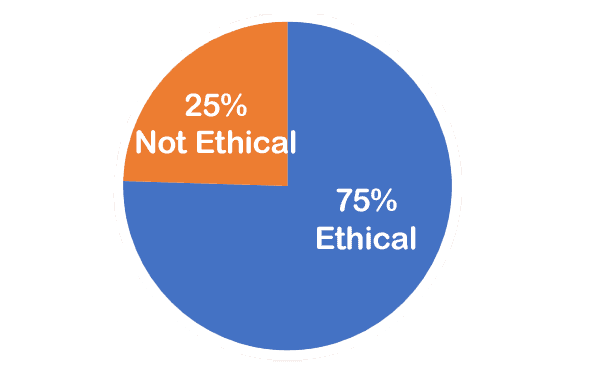This is the December 2022 edition of our monthly series of Ethics case studies titled What Do You Think? This series is comprised of case studies from NSPE archives, involving both real and hypothetical matters submitted by engineers, public officials and members of the public.
Your peers and the NSPE Board of Ethical Review have reviewed the facts of the case as shown below. And, here are the results.
Your opinion has been registered for the December 2022 edition of our monthly series of Ethics case studies titled What Do You Think?
Your vote is recorded as:

Want to know how your peers voted? We’ll send you an email with the poll results on December 27.
Your opinion has been registered for the December 2022 edition of our monthly series of Ethics case studies titled What Do You Think?
Your vote is recorded as:

Want to know how your peers voted? We’ll send you an email with the poll results on December 27.
A Review of the Facts
Engineer Margaret, a prominent professional engineer in her community, decides to run for a political office in Smith County and uses as her slogan the following: “Engineer Margaret: Engineering A Better Smith County.”
Was it ethical for Margaret to use the slogan “Engineer Margaret: Engineering A Better Smith County” when running for political office?
Here is the result of our survey of your peers:

Applicable NSPE Code References:
Code III.1
Engineers shall be guided in all their relations by the highest standards of honesty and integrity.
Code III.1.e
Engineers shall not promote their own interest at the expense of the dignity and integrity of the profession.
Code III.2.a
Engineers are encouraged to participate in civic affairs; career guidance for youths; and work for the advancement of the safety, health, and well-being of their community.
Code III.3.a
Engineers shall avoid the use of statements containing a material misrepresentation of fact or omitting a material fact.
Discussion
The facts in the case presented combine several sections of the NSPE Code of Ethics: the engineers’ obligation to participate and be a constructive force in public affairs (See Code III.2.a.), and the engineers’ obligation to avoid statements that are misleading, deceptive, and causing dishonor on the engineering profession (Code III.1, Code III.1.e., and Code III.3.a.).
The Board of Ethical Review has evaluated cases involving the political candidacy of engineers on at least two occasions. In BER Case 74-10, the Board considered a case involving engineer Richard Roe, a partner in an engineering firm. Roe became a candidate for nomination to the state senate in a primary election and, in support of his candidacy, issued a statement on the firm stationary. The name of the firm on the letterhead was “Richard Roe Associates.” The letterhead contained the usual type of listing of partners, their society affiliations and addresses, and telephone number. In the basic statement, Roe recites his membership in several professional societies and in a fraternal order, his previous involvement in political activities, and experience in planning and design of various types of public works, including reference to one particular major project. The statement alluded to his close contact with the government and the spending of public funds. The announcement also contained the following statement: “He feels that his training and experience will be very helpful in unraveling some of the glaring inequities in state laws relating to the employment of professional services. There are more iniquities in the laws than most realize.”
The Board determined that the use of the engineering firm stationary in the manner indicated to promote the political candidacy of a professional engineer was not ethically permissible, but that an engineer could utilize his professional affiliations, background, and experience in promoting his political candidacy in regular political material. Citing earlier cases, the Board noted that it is both ethical and desirable that professional engineers be involved in political causes and be candidates for public office. In seeking public office, an engineer may properly utilize his engineering competence and background.
A subsequent case involved engineer Roe in which Roe, who had previously been the mayor of a town and decided to run again, published a political advertisement in a local newspaper urging voters to vote for Roe and against Roe’s opponent, the current mayor. The advertisement charged that many thousands of tax dollars had been spent on engineering and consulting fees by the current mayor and that during Roe’s term, only a fraction of that amount had been spent on design and consulting fees. The Board concluded that the political advertisement utilized by Roe was not ethically permissible.
Turning to the facts of this particular case, the Board believes that engineers who are involved in public affairs have a special obligation to promote the public’s knowledge and understanding of engineering and not engage in gimmickry and slick sloganeering or promotions at the expense or dignity of the engineering profession. Engineers who run for public office should make special efforts to provide the public—a public which in survey after survey demonstrate an almost complete lack of any meaningful understanding of the engineering profession—with a fuller understanding and appreciation of the accomplishments of engineers to society.
While the Board can recognize that some might object to the use of the term “engineering” because it might be viewed as a gimmick and cause the public to be misled or deceived in the context in which it is used, the Board is not of the opinion that the use of the term goes beyond the bounds of ethics and therefore considers Margaret’s actions ethical.
Nevertheless, the Board is of the view that a more preferable approach for Margaret would have been to avoid the use of the slogan and to explain in great detail how her skills as an engineer would be of benefit to the public in her role as a public official. The Board believes that such an approach would both serve the interests of public discourse on the benefits of engineering skill and judgment among publicly elected officials and would raise the stature and the image of the engineering profession among members of the public. The Board has repeatedly encouraged engineers to become more active in civic affairs, and engineers have an obligation to do so in a professional and dignified manner.
The Ethical Review Board’s Conclusion

It was ethical for Margaret to use the slogan “Engineer Margaret: Engineering A Better Smith County” when running for political office.
BOARD OF ETHICAL REVIEW
Lorry T. Bannes, P.E., James G. Fuller, P.E., Donald L. Hiatte, P.E., Joe Paul Jones, P.E., Paul E. Pritzker, P.E., Richard Simberg, P.E., C. Allen Wortley, P.E., Chairman
Note – In regard to the question of application of the Code to corporations vis-a-vis real persons, business form or type should not negate nor influence conformance of individuals to the Code. The Code deals with professional services, which services must be performed by real persons. Real persons in turn establish and implement policies within business structures. The Code is clearly written to apply to the Engineer and it is incumbent on a member of NSPE to endeavor to live up to its provisions. This applies to all pertinent sections of the Code. This opinion is based on data submitted to the Board of Ethical Review and does not necessarily represent all of the pertinent facts when applied to a specific case. This opinion is for educational purposes only and should not be construed as expressing any opinion on the ethics of specific individuals. This opinion may be reprinted without further permission, provided that this statement is included before or after the text of the case.








Other professions do it, particularly lawyers, so why not? Sometimes I think the ‘ethics’ of engineering was developed by lawyers in an attempt to marginalize us.
Agreed.
I always emphasize to my students that the doctors and the lawyers aren’t the only ones with the most honorable of professions.
Of course you can run for office and identify yourself as an engineer. If you’re a PE, it’s public record, so inquiring minds will find out soon enough.
But I’m not sure how well ‘Engineering a better…’ will resonate with the electorate. Many of us have had a bellyful of politicians (engineers by training or otherwise) trying to engineer our future, and wish they would stop.
Margaret is trading on her education and career background. I see no problem with that. If she is using her PE designation or trading on her registration that’s a different story.
I disagree with the board. I fully support the position of RIch Wargo, above.
“Nevertheless, the Board is of the view that a more preferable approach for Margaret would have been to avoid the use of the slogan and to explain in great detail how her skills as an engineer would be of benefit to the public in her role as a public official.”
Ummm, yeah…
While that may be the more “professional” approach, it neither fits on a bumper sticker nor does it hold the reader’s attention all the way from “Nevertheless” to the period at the end of that sentence.
This is a slogan we’re discussing here. Like it as not, short and sweet is the only way to go.
More detailed pitches are best reserved for other audiences and venues.
The Board is too far removed from reality to be relevant here.
Seems like a no brainer to me. We have so many elected public officials that don’t appear to be qualified to do anything but get re-elected. I’ve often thought that all government officials should be required to earn professional development credits; particularly in courses in economics and ethics.
PDH’s for elected officials is a great idea!
I’m bothered by the use of the term “Engineering a better future”.
Engineer Margaret should only “engineer” within her scope of her experience and training. Has she “engineered” the future before? How did she get this experience?
Her use of this term diminishes our profession and adds to the public’s confusion of what engineers do for her personal gain. A violation of Code III.1.e
Doctors do it all the time! I am surprised by this topic. There is a long list of politicians running for the office or in office that used their titles in their campaigns.
It is okay to identify yourself as an engineer. The slogan just makes me cringe.
I believe Margaret is in order in highlighting her profession and experience as an engineer. However, we must be careful not to overuse the engineering title in every political discuss to avoid cheapening the title and the profession. One must craft their words well and carefully to place the name, “engineer”, in high esteem.
Politicians have the tendency to overpromise and short in delivery. That should not be associated with the engineering profession.
I firmly believe that we need more engineers and scientist in politics and less lawyers. There are practically no people in congress with a technical background and that is intrinsically dangerous in a democracy.
I think that Margaret was ethical, but using her credentials to say she would ‘engineer a better county’ may be a bit of a stretch, depending on what office she is running for and the circumstances (both unknown). In a county that is (let’s say) in need of many capital improvements, it may be a good fit. However, if the ‘pitch’ is merely to advertise that the she is a professional and it’s not very pertinent to the position and circumstances, it seems to be a bit less ‘worthy,’ opportunistic (?). In any case, there is nothing derogatory about it and it’s honest, so opinion here is that it’s ethical.
“Politicians have the tendency to overpromise and short in delivery.”
I think that could reasonably be said of most people in most professions.